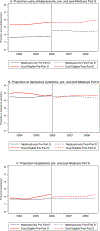Impact of Medicare Part D on mental health treatment and outcomes for dual eligible beneficiaries with HIV
- PMID: 30189747
- PMCID: PMC6342646
- DOI: 10.1080/09540121.2018.1516283
Impact of Medicare Part D on mental health treatment and outcomes for dual eligible beneficiaries with HIV
Abstract
Depression is common among women with HIV and untreated depression can result in poor quality of life and worsen HIV outcomes. Women with HIV who are dually enrolled in Medicaid and Medicare faced a potential disruption in medication access when Medicare Part D was implemented in 2006. The goal of this study was to estimate the effects of Medicare Part D implementation on antidepressant use, depressive symptoms, and hospitalization in Medicaid-Medicare dual eligible women with HIV. This study used 2003-2008 data from the Women's Interagency HIV Study. The effects of Medicare Part D were estimated using a difference-in-differences approach, adjusting for temporal trends using a matched control group of Medicaid-only enrollees. Before Medicare Part D implementation, dual eligibles differed from Medicaid-only enrollees in antidepressant use and hospitalization, despite having identical prescription drug coverage through Medicaid. For dual enrollees, the transition to Medicare Part D was not associated with changes in antidepressant use, depressive symptoms, or hospitalization. We did not find disruptive effects on antidepressant use and related outcomes among dual eligibles in this study. Stable antidepressant use may be due to better access to medical care for dual eligibles through Medicare both before and after Medicare Part D implementation, which may have eclipsed any effects of the transition. It may also signal that classification of antidepressants as a protected drug class under Medicare Part D was effective in preventing psychiatric medication disruption.
Keywords: HIV; Medicare Part D; mental health.
Conflict of interest statement
Figures
References
-
- Barkan SE, Melnick SL, Preston-Martin S, Weber K, Kalish LA, Miotti P, … Feldman J. (1998). The Women’s Interagency HIV Study. Epidemiology, 9(2), 117–125. - PubMed
-
- Bouhnik A-D, Preau M, Vincent E, Carrieri MP, Gallais H, Lepeu G, … Spire B (2005). Depression and clinical progression in HIV-infected drug users treated with highly active antiretroviral therapy. Antiviral Therapy, 10(1), 53–61. - PubMed
-
- Cleveland WS (1979). Robust Locally Weighted Regression and Smoothing Scatterplots. Journal of the American Statistical Association, 74(368), 829–836.
-
- Crowley, J. S., & Ashner, D. (2005). State Medicaid Outpatient Prescription Drug Policies: Findings from a National Survey, 2005 Update Prepared. Health Policy, (October).
Publication types
MeSH terms
Substances
Grants and funding
- U01 HL146241/HL/NHLBI NIH HHS/United States
- R38 AI140299/AI/NIAID NIH HHS/United States
- U01 AI103397/AI/NIAID NIH HHS/United States
- U54 AG062334/AG/NIA NIH HHS/United States
- U01 AI031834/AI/NIAID NIH HHS/United States
- U01 HL146245/HL/NHLBI NIH HHS/United States
- U01 AI035004/AI/NIAID NIH HHS/United States
- U01 HL146205/HL/NHLBI NIH HHS/United States
- U01 AI034989/AI/NIAID NIH HHS/United States
- F32 HS024858/HS/AHRQ HHS/United States
- UL1 TR000454/TR/NCATS NIH HHS/United States
- U01 AI103401/AI/NIAID NIH HHS/United States
- UL1 TR000004/TR/NCATS NIH HHS/United States
- U01 AI103408/AI/NIAID NIH HHS/United States
- U01 HL146194/HL/NHLBI NIH HHS/United States
- U01 AI034994/AI/NIAID NIH HHS/United States
- R21 AG059505/AG/NIA NIH HHS/United States
- T32 HS000032/HS/AHRQ HHS/United States
- U01 AI103390/AI/NIAID NIH HHS/United States
- U01 AI034993/AI/NIAID NIH HHS/United States
- U01 HL146203/HL/NHLBI NIH HHS/United States
- P30 AI050410/AI/NIAID NIH HHS/United States
- U01 HD032632/HD/NICHD NIH HHS/United States
- U01 AI042590/AI/NIAID NIH HHS/United States
LinkOut - more resources
Full Text Sources
Other Literature Sources
Medical

